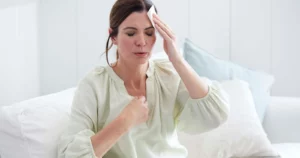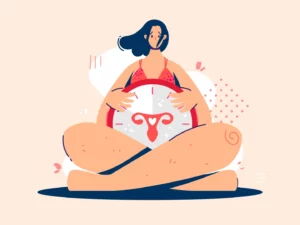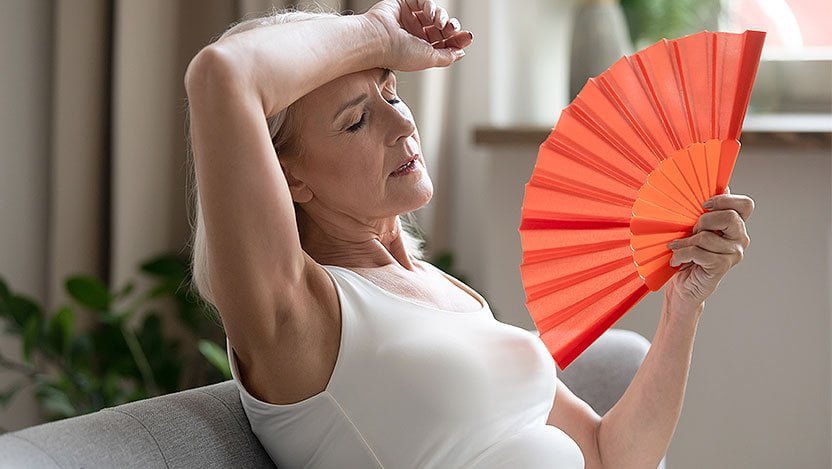As women enter the menopausal phase, they often find themselves grappling with a range of symptoms that can significantly impact their daily lives. Among these, vasomotor symptoms, such as hot flashes and night sweats, stand out as particularly challenging. Fortunately, there are various approaches to manage and alleviate these vasomotor symptoms. In this blog, we’ll explore effective vasomotor symptoms of menopause treatments, lifestyle adjustments, and holistic strategies to help women navigate through the waves of menopausal discomfort.
Contents
What Are The Common Vasomotor Symptoms Of Menopause?
 Vasomotor symptoms are a common and often challenging aspect of menopause, affecting a significant number of women as they transition through this natural life stage. These symptoms are primarily associated with hormonal fluctuations, particularly the decline in estrogen levels. The most prevalent vasomotor symptoms include:
Vasomotor symptoms are a common and often challenging aspect of menopause, affecting a significant number of women as they transition through this natural life stage. These symptoms are primarily associated with hormonal fluctuations, particularly the decline in estrogen levels. The most prevalent vasomotor symptoms include:
- Hot Flashes
Sudden, intense feelings of heat, particularly in the upper body and face. These are accompanied by flushing, redness of the skin, and sometimes perspiration. It can last for a few seconds to several minutes.
- Night Sweats
Similar to hot flashes but occurring during sleep. It often leads to waking up drenched in sweat and may disrupt sleep patterns.
- Cold Flashes
Less common than hot flashes but characterized by sudden sensations of intense cold. It can also cause shivering and discomfort.
- Palpitations
Rapid or irregular heartbeat, which some women may notice during or after a hot flash.
- Chills
Feelings of coldness or shivering, especially after a hot flash.
- Fluctuations in Body Temperature
Women may experience sudden changes in body temperature, feeling excessively warm or cold.
- Mood Swings
Hormonal changes can contribute to mood swings and irritability.
- Sleep Disturbances
Night sweats and discomfort from vasomotor symptoms can lead to insomnia or disrupted sleep.
It’s important to note that the severity and duration of these symptoms vary among women. While some may experience only mild discomfort, others may find vasomotor symptoms significantly impact their quality of life. The duration of these symptoms can also vary, with some women experiencing them for a relatively short period, while others may face them for an extended time during the menopausal transition.
What Are The First-Line Vasomotor Symptoms Of Menopause Treatments?
 The first-line vasomotor symptoms of menopause treatments often focus on relieving symptoms and improving the overall quality of life. It’s important to note that the appropriateness of specific treatments may vary from person to person, and women should consult with their healthcare providers to determine the most suitable approach. Here are some common first-line treatments for vasomotor symptoms of menopause:
The first-line vasomotor symptoms of menopause treatments often focus on relieving symptoms and improving the overall quality of life. It’s important to note that the appropriateness of specific treatments may vary from person to person, and women should consult with their healthcare providers to determine the most suitable approach. Here are some common first-line treatments for vasomotor symptoms of menopause:
Hormone Replacement Therapy (HRT)
Hormone Replacement Therapy (HRT) stands out as a primary and highly effective treatment for vasomotor symptoms of menopause. It involves supplementing the declining levels of estrogen, and sometimes progestin for women with a uterus, to alleviate hot flashes, night sweats, and other related symptoms. HRT is available in various forms, including pills, patches, creams, and gels. While it provides effective relief, the decision to pursue HRT should be made in consultation with a healthcare provider, considering factors such as medical history, age, and individual health risks.
SSRIs) and SNRIs
Antidepressant medications, particularly SSRIs and SNRIs, have demonstrated efficacy in reducing the frequency and severity of hot flashes associated with menopause. Medications like venlafaxine (SNRI) and others in the same class may be prescribed when hormone therapy is not suitable or desired. These drugs work by influencing neurotransmitters in the brain, impacting the body’s response to temperature regulation. While effective, potential side effects and considerations for long-term use should be discussed with a healthcare professional.
Gabapentin and Pregabalin
Originally developed to address seizures and nerve pain, gabapentin and pregabalin have shown promise in reducing the frequency and intensity of hot flashes. These medications, which affect the central nervous system, may be considered when other treatments are not well-tolerated or effective. As with any medication, potential side effects and individual health considerations should be thoroughly discussed with a healthcare provider.
Non-Hormonal Prescription Medications
Certain non-hormonal medications, initially designed for other purposes, have been found to help manage vasomotor symptoms. Clonidine, typically prescribed for blood pressure control, is one such option. It appears to influence the regulation of blood vessels and may contribute to the reduction of hot flashes. It’s important to note that while these medications can be effective, they are not specifically designed for menopausal symptoms, and potential side effects should be considered.
Cognitive Behavioral Therapy (CBT)
Cognitive Behavioral Therapy (CBT) offers a non-pharmacological approach to managing vasomotor symptoms by addressing the psychological aspects associated with menopause. CBT helps women develop coping strategies, manage stress, and modify their responses to hot flashes and related symptoms. Studies have shown that women who undergo CBT may experience a reduction in the frequency and severity of hot flashes, contributing to an overall improvement in their quality of life. This option is particularly appealing to those who prefer non-pharmacological interventions or are looking for complementary approaches to manage menopausal symptoms.
Women must discuss their individual health history, preferences, and concerns with their healthcare provider when considering treatment options. The decision to pursue a particular treatment should be based on a thorough evaluation of the risks and benefits tailored to each individual’s unique circumstances.
What Are Some Natural Approaches For Vasomotor Symptoms?
 Natural approaches for managing vasomotor symptoms of menopause focus on lifestyle changes, dietary modifications, and the use of herbal supplements. While the effectiveness of these approaches can vary from person to person, many women find relief. Here are some natural approaches for managing vasomotor symptoms:
Natural approaches for managing vasomotor symptoms of menopause focus on lifestyle changes, dietary modifications, and the use of herbal supplements. While the effectiveness of these approaches can vary from person to person, many women find relief. Here are some natural approaches for managing vasomotor symptoms:
Dietary Modifications
- Phytoestrogen-Rich Foods: Include foods rich in phytoestrogens, such as soy products, flaxseeds, and whole grains. Phytoestrogens have estrogen-like effects and may help balance hormone levels.
- Calcium and Vitamin D: Adequate intake of calcium and vitamin D through dairy products, leafy greens, and supplements can support bone health and may alleviate certain menopausal symptoms.
Herbal Supplements
- Black Cohosh: Widely studied for its potential to reduce hot flashes and night sweats, black cohosh is a popular herbal remedy for menopausal symptoms. However, individual responses vary, and it’s essential to consult with a healthcare provider before use.
- Dong Quai: This Chinese herb is traditionally used to address menopausal symptoms. It is believed to have estrogen-like effects and may help with hot flashes and mood swings.
- Red Clover: Another source of phytoestrogens, red clover supplements have been explored for their potential to reduce hot flashes. As with any supplement, it’s crucial to discuss it with a healthcare professional.
Regular Exercise
Engaging in regular physical activity has been shown to reduce the frequency and severity of hot flashes. Both aerobic exercises, such as walking or swimming, and strength training can be beneficial. Exercise also contributes to overall well-being and helps manage stress.
Mind-Body Techniques
- Yoga and Meditation: Mind-body practices like yoga and meditation can help manage stress and promote relaxation. Some women find that incorporating these techniques into their routine contributes to a reduction in the intensity of vasomotor symptoms.
- Deep Breathing Exercises: Practicing deep, slow breathing can help regulate the autonomic nervous system, potentially decreasing the occurrence of hot flashes.
Acupuncture
Acupuncture, an ancient Chinese practice involving the insertion of thin needles into specific points on the body, has been explored as a complementary therapy for menopausal symptoms. Some studies suggest that acupuncture may help reduce the frequency and severity of hot flashes.
Cooling Strategies
- Cooling Bedding and Clothing: Use lightweight, breathable bedding and sleepwear to help regulate body temperature during the night.
- Cooling Facial Mists: Keep a facial mist in the refrigerator and use it during hot flashes for a quick cooling sensation.
It’s crucial to approach natural remedies with caution and to communicate openly with healthcare professionals. What works for one person may not work for another, and individual responses can vary. Additionally, natural remedies may have interactions with medications or pre-existing health conditions, underscoring the importance of seeking personalized advice from a healthcare provider.
Conclusion
In conclusion, vasomotor symptoms of menopause treatments involve a combination of medical, lifestyle, and natural approaches. From hormone replacement therapy and prescription medications to dietary changes, herbal supplements, and mindfulness techniques, women have a range of options to explore based on their unique needs and preferences. Lifestyle modifications, such as regular exercise and cooling strategies, also play a crucial role.
Women need to consult with healthcare professionals to find the most suitable combination of treatments. Thus, ensuring a personalized and effective approach to managing the challenges of menopausal symptoms. By embracing a holistic perspective and staying informed, women can empower themselves to navigate this phase with resilience and well-being. If you are facing menopause-related issues, menopause treatment at HerMantra can help. Book your free trial online menopause treatment session now.


